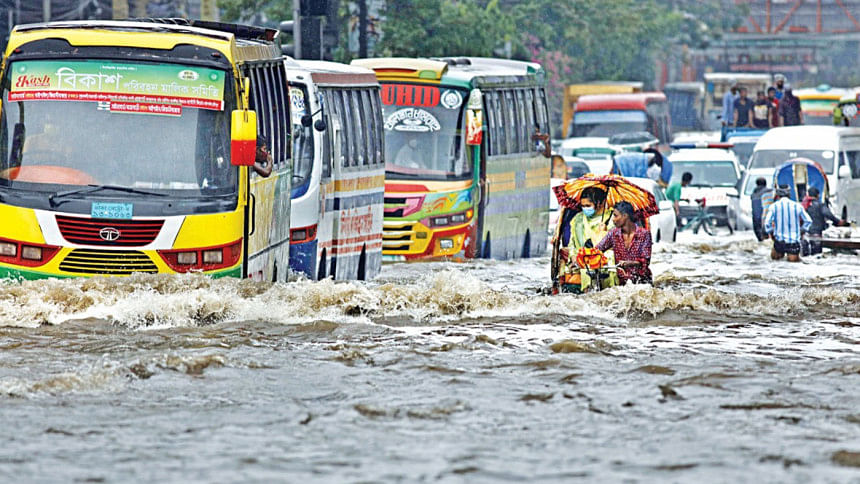Give drainage to Dhaka city corporations

Waterlogging in Dhaka is turning into a severe problem due to the lack of coordination among the responsible government organisations, their unhealthy competitions and culture of blame, said Transparency International Bangladesh (TIB).
Last week, much of the capital was submerged following incessant rainfall. In many places, people were found walking in waist-deep water.
According to the anti-graft watchdog, there was a lack of coordination among the three organisations responsible, including the two city corporations and Dhaka Water Supply and Sewerage Authority (Wasa) in drain and waste management.
TIB asked the government to hand over the drainage management system to the two city corporations -- Dhaka South City Corporation and Dhaka North City Corporation.
In a statement, TIB Executive Director Dr Iftekharuzzaman said according to the corresponding laws, Wasa is responsible for the construction and maintenance of major drainage systems while the city corporations look after connecting lines.
Of the entire drainage system of Dhaka, Wasa looks after 385 kilometres of drainage system whereas the city corporations are responsible for 2,500 kilometres.
Besides, there are 26 canals, a total of 74 kilometres in length, and 10 kilometres of box culverts maintained by Wasa.
"Due to the legal complexities, the organisations blame each other to avert their responsibilities whenever the city suffers from waterlogging during the monsoon," said the TIB executive director.
"That's why it is necessary to amend the Acts and hand over the drainage management responsibility to a single organisation. In this case, the responsibility should be handed over to the city corporations as they represent the public. They need to be given the power to evaluate Wasa's activities," he said.
Saying that Wasa has failed to solve waterlogging problems in previous years too, Iftekharuzzaman added that Wasa in one its reports claimed they have become able to clean 20 out of 26 canals.
However, TIB in its research found that these canals are not cleared; instead, heavy solid waste has clogged the entry points of the canals.
Iftekharuzzaman said Wasa does not regularly monitor maintenance of its canals and drainage. Although responsible officers of Wasa are supposed to inspect drains and canals at least twice a month, they do not do and that creates scope for grabbing.
"Therefore, Wasa has no scope to deny its failure. On the other hand, city corporations could not avert their failures in maintaining drains and waste management," he added.
TIB in its research also found that in many cases, the city corporations do not dispose of the waste of canals and drains after cleaning by Wasa.
The TIB executive director said there remains a question over whether the city corporations are able to properly clean the 2,500 kilometres of drains under their purview.

 For all latest news, follow The Daily Star's Google News channel.
For all latest news, follow The Daily Star's Google News channel. 



Comments